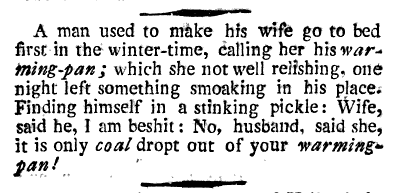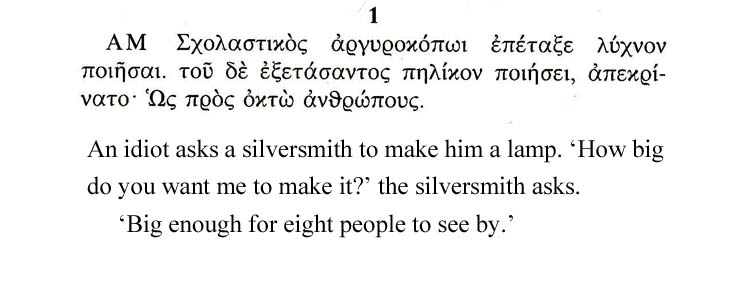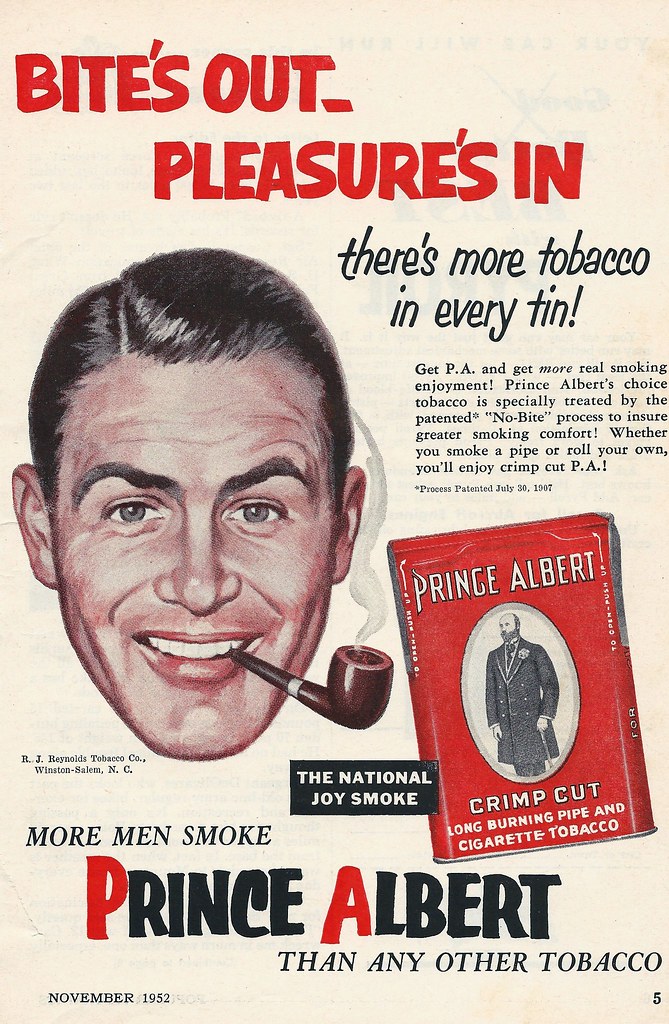I’ve lately taken an interest in collecting jokes that haven’t aged well. By which I mean: jokes that no longer work, or require explanation, because they’re conceptually ‘dated’. Typically, these jokes aren’t funny any more, or are only funny to people who were around at the time that they were first conceived, and I imagine that we, as a civilisation, are necessarily relegating more and more jokes into this particular category as time goes on.

My favourite joke of this category is the following classic student joke, which was relevant when I first heard it in the 1990s:
What’s pink and takes an hour to drink?
Grant cheque
By way of explanation: the grant cheque was how British students used to receive their government aid to support them during their studies. It had become gradually smaller (relative to the value of the pound) over time by failing to rise in value in line with inflation, and was printed on pink paper, hence the joke. There was an effort to revive it in the late 1990s/early 2000s as follows:
What’s green and takes an hour to drink?
Loan cheque
By this point, the grant had been replaced by the student loan, whose payments came printed on green paper instead. This is, of course, simply an example of adapting an old joke for a new audience, as we’ve all seen time and again with the inevitable string of recycled gags that get rolled-out every time a celebrity is accused of a sex crime. Incidentally, the revised form of the grant cheque/loan cheque joke has itself become dated as students now typically receive all of their loan payments directly to their bank accounts for convenient immediate spending rather than what my generation had to do which was to make the beans-and-rice stretch another few days until the cheque cleared.

Here’s another example:
Bill and Ben the flower pot men are in the garden.
“Flobalobalobalob,” says Bill
Ben replies: “You’re drunk, Bill.”
Now those of you who are about my age, or older, are unlikely to see why this joke has dated badly. But it is dated, because the 2001 reboot of The Flower Pot Men (now called simply Bill and Ben) features the titular characters speaking in reasonably-normal English! The idea that they were only speaking Oddle Poddle because they were too pissed to speak English is no longer a point of humour, and increasingly the population won’t remember the original stilted dialect of the flower pot men. If we assume that anybody under the age of 24 is more-likely to have come across the newer incarnation then that’s a third of the population!
Let’s try another, which became dated at about the same time:
Why are hurricanes names after women?
Because when they come they’re wet and wild and when they go they take your house and your car.
The history of how we’ve named hurricanes over the centuries is really quite interesting, and its certainly true that for the majority of the period during which both meteorologists and the general public have shared the same names for tropical storms they’ve been named after women. Depending on where you are in the world, though, it’s not been true for some time: Australia began using a mixture of masculine and feminine names during the 1970s, but other regions took until the millennium before they followed suit. However, the point still remains that this joke has been dated for a long while.

Here’s a very highly-charged joke from the 1960s which I think we can all be glad doesn’t make much sense any more:
What’s all black and comes in an all white box?
Sammy Davis Jr.
For those needing the context: Sammy Davis Jr. was a black American singer, comedian, and variety show host who triggered significant controversy when he married white Swedish actress May Britt. Interracial marriage was at the time still illegal across much of the United States (such prohibition wouldn’t be ruled unconstitutional until the amazingly-named “Loving Day” in 1967) and relationships between whites and “coloureds” were highly taboo even where they weren’t forbidden by law.
Topical jokes like that are often too easy, like this one – even shorter-lived – from the summer of 1995, presented here with no further interpretation:
Q: What’s the difference between O. J. Simpson and Christopher Reeve?
A: O. J.’s gonna walk!
Perhaps my favourite strictly-topical joke of this variety, though, comes from 1989:
Q: Why is Margaret Thatcher like a pound coin?
A: She’s thick, brassy, and she thinks she’s a sovereign.
It’s at least two-thirds funny even if you don’t have the full context, and that’s what’s most-interesting about it: it’ll take until the new £1 becomes ubiquitous and the old one mostly-forgotten before it will lose all of its meaning. But as you’ve probably forgotten why the third part of the punchline – “…and she thinks she’s a sovereign” – comes from, I’ll illuminate you. The joke is wordplay: there are two meanings to “sovereign” in this sentence. The first, of course, is that a sovereign is the bullion coin representing the same value as a conventional pound coin.
To understand the second, we must first remind ourselves of the majestic plural, better known as the “royal ‘we'”. In 1989, following the birth of her grandson Michael, Thatcher made a statement saying “we have become a grandmother”, resulting in much disdain and mockery by the press at the time. The Prime Minister’s relationship with the Queen had always been a frosty one, and Thatcher’s (mis)use of a manner of speech that was typically reserved for the use of royalty did nothing to make her look any more-respectful of the monarch.

The final example I’ve got died out as a joke as a result of changing brand identities, more cost-effective packaging materials, and the gradual decline of tobacco smoking. But for a long while, while Prince Albert Pipe Tobacco was still sold in larger quantities as it always had been, in a can, a popular prank perpetrated by radio stations that went in for such things was to call a tobacconist and ask, “Have you got Prince Albert in a can?”. The tobacconist would invariably answer in the affirmative, at which point the prankster would response “Well let him out then!” This joke may well predate the “Is your refrigerator running?” prank call that might be more-familiar to today’s audiences.
If you’ve got any jokes that have aged badly, I’d love to hear them. And then, I suppose, have them explained to me.
I heard the oldest recorded joke on a podcast. It can still work but the double negatives make it a little frustrating:
“An incident occurred that has never been recorded before: a young girl sat on a man’s lap without breaking wind.”
Looking back I don’t think the wording’s not exactly right.